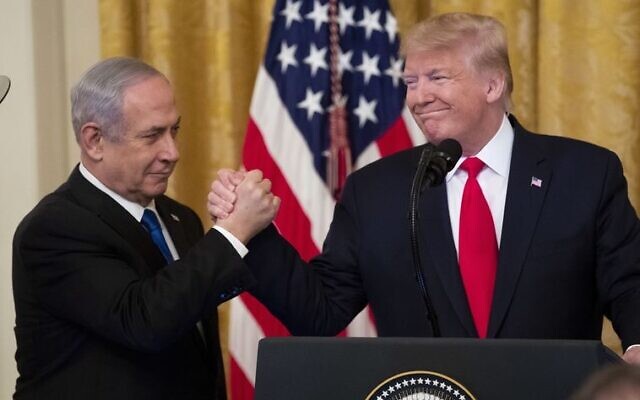Deal or no deal?
Australian Jewish leaders say the long-awaited plan 'constitutes a positive step towards' peace but 'will require the sustained involvement of both sides in the process'.

AUSTRALIAN Jewish leaders have cautiously welcomed a bold plan for peace between Israel and the Palestinians rolled out by US President Donald Trump in the early hours of Wednesday morning (Australia time), but they emphasised a comprehensive peace depends on Palestinian willingness to embrace its conditions.
The much anticipated plan offers Israel sovereignty of key areas of the West Bank, but also offers the Palestinian Authority (PA) a demilitarised independent state on contiguous territory on condition the PA renounces terrorism, acknowledges Jerusalem as the capital of Israel, cleans up corruption and stops terrorism from Hamas and Islamic Jihad.
The blueprint outlines a four-year transition period in which the PA needs to fulfil the conditions set out, and Israel needs to freeze settlement expansion. However, PA President Mahmoud Abbas has already rejected the plan, stating emphatically, “We say a thousand times over: No, no, no.”
On Wednesday, Australian Foreign Minister Marise Payne said, “Australia welcomes the proposal as a first step towards further discussions on the creation of a two-state solution.”
Stating any peace arrangement “needs to be negotiated directly between Israel and the Palestinians”, Payne added, “We welcome any initiative that can assist the resumption of direct negotiations between Israel and the Palestinians for an end to this conflict, and the agreement of a durable and resilient peace settlement.
“We commend all parties to resume good faith discussions towards peace and a two-state solution.”
While no Palestinian officials attended the White House announcement, the plan was welcomed by Israeli Prime Minister Benjamin Netanyahu and Blue and White leader Benny Gantz, both invited by Trump to Washington for talks this week.
Flanked by Netanyahu at the White House, Trump described his administration’s 80-page document as the most comprehensive peace plan ever devised. “We will form a joint committee with Israel to convert the conceptual map into a more detailed and calibrated rendering so that recognition can be immediately achieved.
“We will also work to create a contiguous territory within the future Palestinian State for when the conditions for statehood are met, including the firm rejection of terrorism,” he added. “Under this vision, Jerusalem will remain Israel’s undivided – very important – undivided capital. And the United States will recognise Israeli sovereignty over the territory that my vision provides to be part of the State of Israel,” said Trump.
Netanyahu told Trump he has “charted a brilliant future … for Israelis, Palestinians, and the region – by presenting a realistic path to a durable peace”.
Gantz described Trump to media as a “true and courageous friend of the state of Israel”.
Executive Council of Australian Jewry co-CEO Alex Ryvchin stated, “The plan falls short of the maximalist demands of both sides but it is a pathway to peace and a two-state solution, and as such, deserves careful consideration. But this won’t happen as the Palestinians rejected it before it was even unveiled.
“The Palestinians will need to decide what is more important to them – remaining committed to the ‘cause’ of anti-Zionism or accepting the need to compromise, seizing the chance to build a society and a national home, and accepting that half a loaf is better than no bread.”
Zionist Federation of Australia president Jeremy Leibler noted, “We are hopeful that Mr Trump’s unorthodox methods might be what is needed to restart the peace process but ultimately, a successful peace will require the sustained involvement of both sides in the process.”
Australia/Israel & Jewish Affairs Council executive director Colin Rubenstein said the plan “constitutes a rethink of the stale, entrenched conventional wisdom”, adding that it “offers realism in meeting Israel’s security needs while addressing key Palestinian aims in still providing the possibility of a Palestinian state with a capital in eastern Jerusalem – along with the $50 billion economic plan to kickstart the Palestinian economy”.
Noting it sends “a firm signal to the Palestinian leadership” that they can no longer afford to be intransigent, reject compromise and refuse to negotiate, he added, “despite the real obstacles ahead, the plan constitutes a positive step towards encouraging the eventual resumption of negotiations in the pursuit of genuine peace.”
- Donald Trump
- News
- Australia
- International
- Peace deal
- Israel
- Benjamin Netanyahu
- Benny Gantz
- Executive Council of Australian Jewry (ECAJ)
- Alex Ryvchin
- Australia/Israel and Jewish Affairs Council (AIJAC)
- Colin Rubenstein
- Jeremy Leibler
- Zionist Federation of Australia (ZFA)
- United States
- Marise Payne
- Federal government

comments